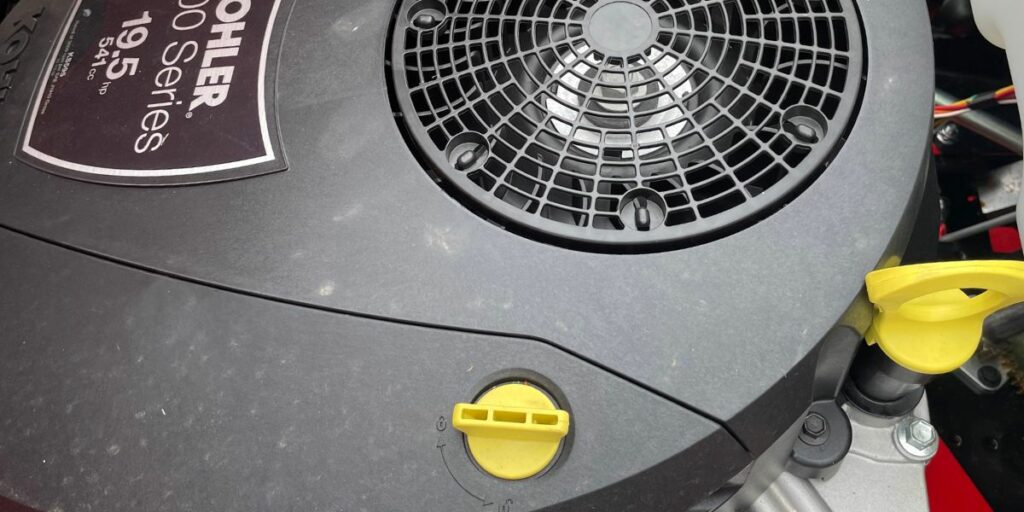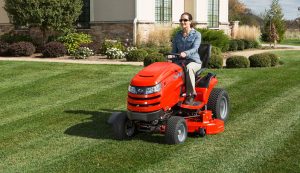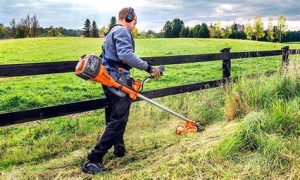A Kubota Mower with Too Much Oil (This Happens)
You keep an eye on the oil level to prevent the engine from running dry. Did you realize, however, that too much oil can be detrimental to an engine as well?
Overheating, damaged seals, blown gaskets, and a hydrolocked engine are all possible outcomes of using too much engine oil in a Kubota lawn mower.
There’s a chance that adjusting the engine oil level will solve your issues, but it’s also possible that it won’t. Vehicle engines may be damaged by the internal tank pressure.
First, let the engine cool down before removing the spark plug boot(s) and diagnosing the problem.

Before diagnosing, repairing, or operating, be sure you’ve read and understood all of the safety recommendations in the equipment’s operator’s manual. If you don’t feel confident in your ability to make the repair or if you lack the necessary expertise or experience, you should get some help from a professional.
Table of Contents
5 Things That Happen When a Kubota Lawn Mower Has Too Much Oil
The Failure of a Kubota Mower’s Engine Seal
If you add too much engine oil to the crankcase, the pressure within will rise. Oil may flow from the engine if the seals were blown.
Don’t delay in tracking down the source of the oil leak; else, you risk blowing up your engine from lack of lubrication.
Running the engine without enough oil causes it to overheat. It’s possible for the temperature to go so high that it spins a rod or welds it to the crankshaft.
Also, the rod can crack under the intense heat and fly out of the engine block. A welded piston might cause a cylinder to seize up.
The Kubota Lawnmower Engine May Overheat
When the oil level in a Kubota lawnmower’s engine is too high, the crankshaft and connecting rod have to work harder to move.
This raises the pressure inside the engine’s crankcase, putting stress on the moving components inside.
The rocker arm and valve spring will heat up. An increase in temperature is possible if the oil does not flow freely. The fact that most engine components are made of aluminum—which itself heats up considerably—only makes matters worse for your Kubota lawn mower.
When the engine gets too hot, the valve guide or valve seat might be forced out of the engine block. An skilled small engine mechanic will need to scrape out your engine if this happens to you.
Kubota Lawn Mower Engines May Lock Up
If oil gets into the cylinder, it might be exceedingly difficult to turn the engine over. Because of this wear, if the oil gets past the rings, it could cause the engine to seize. It’s hydrolocked because of this condition.
Oil has made its way into the combustion chamber, which is supposed to hold just air and a tiny amount of fuel.
Hydrolock occurs when the piston is unable to compress the oil during the compression process. If you try to start the engine while the piston is bent, the engine will likely explode.
Kubota Lawn Mower Engines May Smoke and Not Operate Good
An overfilled oil pan can still get your engine going, but it won’t perform very well. Spark plugs can be fouled if engine oil makes its way up to them.
Oil prevents a spark from reaching the gasoline, which is essential for ignition.
Oil getting into the valve train is another potential source of lawnmower performance issues. When this oil is burned in the cylinder, it produces a cloud of odoriferous, bluish white smoke.
Clogged air filters can cause the engine to pull air and oil out of the crankcase, among other problems.
A Kubota Lawnmower’s Engine Might Blow Gaskets
You will find that the engine issues you have with a Kubota push mower, riding mower, or zero-turn mower are all very similar. Overfilling with oil can cause gaskets to melt due to the extreme heat produced.
Due to the time and effort required to disassemble a twin-cylinder engine from a riding mower, gasket replacement for such an engine is more expensive than for a single-cylinder engine.
In Concluding
The simple act of adding more oil to your vehicle’s engine may seem inconsequential, but it can potentially lead to expensive repairs or even a complete engine replacement.
Be sure to double-check the oil level and add only the amount recommended by the manufacturer when servicing your vehicle’s engine. You can’t presume that paying more than necessary won’t cause problems.
If you hear strange noises coming from your Kubota’s engine, you shouldn’t keep driving it. When engine problems persist beyond what can be repaired with an oil change or other minor repair, it’s time to call in a professional small engine mechanic.
The mechanic can inspect the engine and decide whether or not it is worth fixing.
Excess Oil Draining Methods for Kubota Lawnmowers
In the event that engine oil has overfilled, it must be drained back down to the proper amount. The spark plug wire must be disconnected first for your own protection. The engine oil from your Kubota mower can be drained in a number of different ways.
- If your lawnmower has a drain plug or valve port, you’ll need to locate it on the engine. Under the lawnmower, you can look for it in the oil pan or on the engine’s side, near the dipstick.
- Prepare a container to catch the used oil. Take the plug out for a second, and then put it back in. See whether you need to add oil.
- If your engine has an oil filter, you can release some oil by taking it out temporarily. You should prepare a towel to soak up the oil.
- Fill Port: Certain lawnmowers don’t have a way to drain oil or a filter. In order to get a little oil out of the fill hole, you may have to tip over many push mowers because their small engines don’t have drain plugs.
- A pump designed specifically for extracting oil is called an oil evacuator. A tube is placed in the engine’s oil fill hole, and oil is extracted through it.
- Remove little amounts of oil with ease using a turkey baster. If you use it in your car’s engine, throw it away and don’t put it back in the stove. As replacements go, these don’t cost much.
How to Prevent Oil Overfilling in a Kubota Mower
Looking at the owner’s manual will tell you how much engine oil you need for your lawn mower.
The crankcase capacity can be found via Google or another search engine if you do not have access to the owner’s handbook.
To properly lubricate the engine of a push mower, roughly 3/4 of a quart of motor oil is recommended. As a general rule, 2 quarts of gas is required for a v-twin engine.
Commercial lawn mowers with what are called big block engines require three gallons of motor oil. Typically, the horsepower of such larger motors is at least 34.
Knowing your engine’s crankcase capacity and adding no more than 1/2 quart of oil at a time will prevent you from accidentally flooding your engine. Keep an eye on the oil levels till you get there.
As you near the full mark on your oil gauge or dipstick, continue adding oil at a slow, steady rate of half a quart at a time.
Would Too Much Oil Stop a Kubota Lawnmower?
Too much oil in the engine can stop your Kubota from working. Lawnmower engines are quite compact, and consequently, their oil pans are tiny.
Given the confines, much room for error is not available. An engine can hydrolock if too much oil is poured into it.
Hydrolocking happens when oil rises above the piston in the cylinder. After the combustion chamber is full of oil, the piston can’t rise to the top of the chamber.
Since the piston is air-only, not oil- or water-resistant, only air may be compressed by it. You can’t start the engine by pulling on the rope or using a starter because the oil won’t compress and allow the piston to move. When this happens, people say that they are hydrolocked.
Also, if there’s too much oil, it can clog up the spark plug and prevent the engine from starting. A second way that too much oil can ruin an engine is by making its way into the carburetor via the valve system and rendering it inoperable.
It’s possible for this oil to get past the carburetor and into the air filter, which would also prevent the engine from starting.
Is your Kubota Lawnmower Still Giving You Trouble?
After you’ve had a lawnmower for a while, it’s bound to develop some sort of trouble, whether it won’t start, won’t stay running, smokes, leaks gas, cuts poorly, vibrates, or something else entirely.
I’ve compiled this manual to assist you save both time and money the next time your Kubota mower breaks down.
Questions and Answers for the Most Often Encountered Kubota Lawn Mower Issues.
It’s better to have a technician fix your Kubota lawn mower if you are unclear of how to diagnose problems with it or how to fix them properly.
If you follow these steps, you won’t have to worry about hurting yourself or causing more harm to the lawn mower. If you’re having trouble with your lawn mower, take it to a dealership or service center that specializes in Kubota products.






